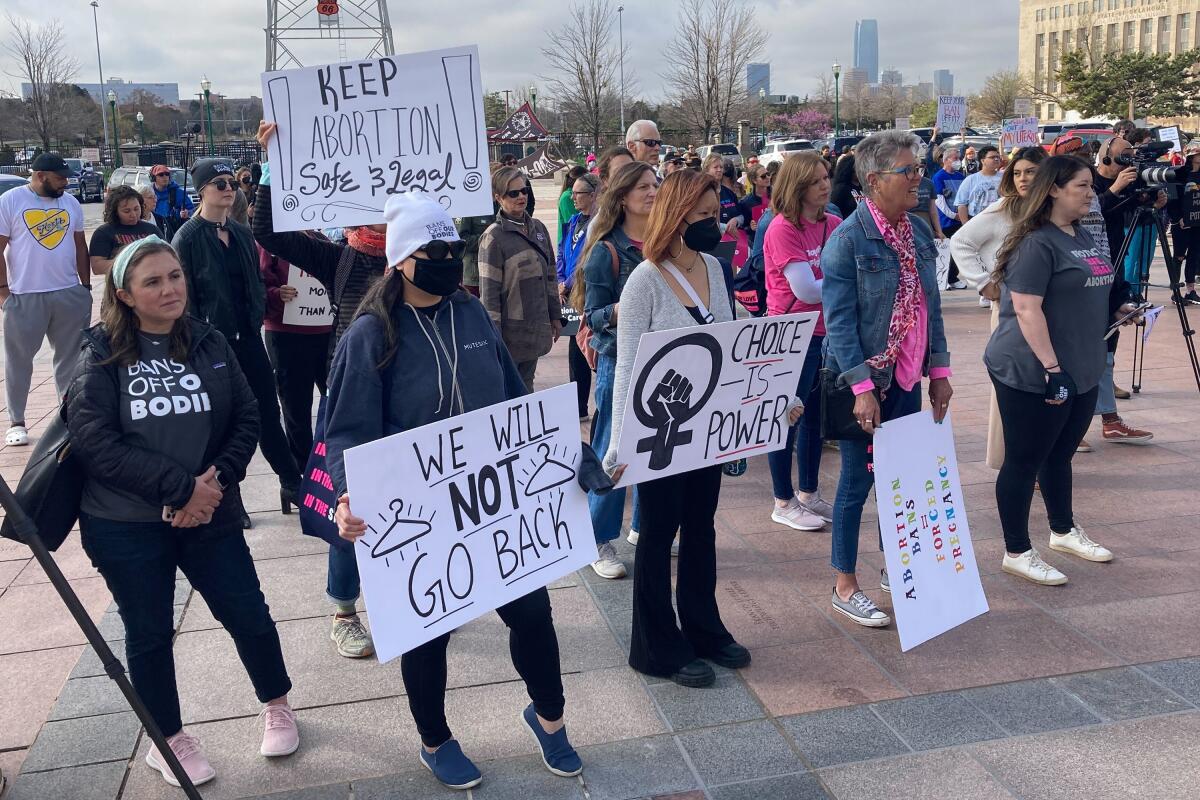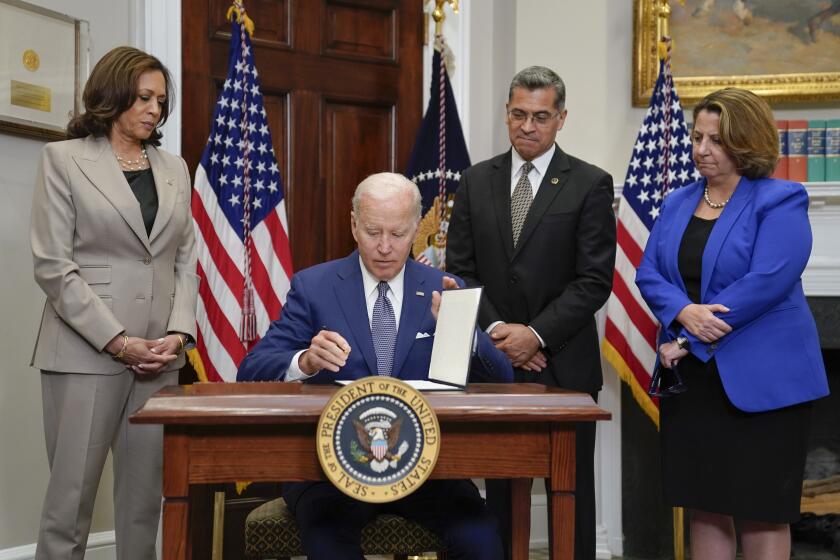Editorial: Think all those state bans on abortion are the final word? Maybe not

- Share via
The fighting in court over abortion is far from over.
For the half century that Roe vs. Wade guaranteed reproduction rights nationwide, abortion advocates had to go to court to fight the hundreds of unnecessary or unconstitutional state restrictions designed to chip away at that right.
Now that Roe is overturned and states in half the country have banned abortion or are about to ban it, advocates are back — this time in state courts, attempting to block abortion bans.
As well they should be. State bans on abortion may be more legally vulnerable than they seem with Roe overturned and the Supreme Court handing states the power to prohibit abortion. For example, some bans may be susceptible to being overturned because they conflict with state constitutions that have been interpreted by courts to guarantee a right to abortion.
Biden signed the executive order aimed at protecting women’s reproductive rights in response to pressure from Democrats after the Supreme Court overturned Roe vs. Wade.
These are uphill battles, but they’re worth fighting — especially in the short term. Clinics are closing and patients desperate for abortion care sometimes have to travel hundreds of miles to another state.
Total bans or bans at six weeks gestation — when women generally don’t even know they’re pregnant — are in effect in 10 states currently, according to officials at the Guttmacher Institute, which researches abortion policy and supports abortion rights. Florida currently bans abortions at 15 weeks of gestation. In three other states — Arizona, West Virginia and Wisconsin — clinics have stopped providing abortions because the laws are unclear on whether it’s outlawed. Each of those states has a pre-Roe ban. But it is legally unclear if and when those bans can go into effect.
Consider how ridiculously confusing the laws are in Arizona: After Roe was overturned, Arizona state Senate Republicans announced that a pre-Roe ban would take effect. But that ban (dating to 1901) had been blocked by courts since 1973 (the year that Roe was decided) and some argued a court would have to lift the block. Months earlier, Arizona Gov. Doug Ducey said a new 15-week ban would take effect if Roe fell — except the law doesn’t make it clear when it would be implemented. To be safe, Planned Parenthood stopped providing abortions for the time being.
In some states with multiple abortion bans on the books, advocates are arguing there is confusion about which laws to follow and that all must be blocked until clarified. In Louisiana, for example, officials issued conflicting statements about which of three bans were in effect, and lawyers argued that the laws were unconstitutionally vague because they failed to explain when one or all would go into effect and what exceptions were permitted and what penalties there would be.
“Patients and doctors have no idea what laws they need to comply with and what exceptions might be possible if any,” Nancy Northup, chief executive of the Center for Reproductive Rights, said in a recent media briefing that also included officials of Planned Parenthood Federation of America and the American Civil Liberties Union. These groups are coordinating their legal efforts.
Their arguments in Louisiana worked at least temporarily. But at a Friday hearing, a state judge ruled that the groups needed to file their case in a court in Baton Rouge because it concerned the state Legislature, which means the ban can go into effect until the lawsuit is refiled and a Baton Rouge judge issues a temporary injunction.
Lawyers also successfully got courts to temporarily block abortion trigger bans in Utah and in Kentucky.
States should not be able to ban FDA-approved abortion pills from being mailed to anyone in the United States.
These are all good if perhaps short-lived measures. Keeping clinics open for a few weeks or months longer means more patients get care.
The more promising cases are the ones in which advocates contend that the bans conflict with state constitutions where privacy rights have been interpreted to include the right to an abortion. That’s the argument in lawsuits filed in Kentucky and Idaho, for example.
Of course, even if the abortion rights advocates win in court, an antiabortion state legislature could amend its constitution to explicitly ban abortion. But a state legislature can’t do that overnight and almost all states require voter approval to amend the constitution. Kentucky already qualified a November ballot to amend its constitution to say it confers no right to abortion. Kansas has a similar constitutional amendment on an August ballot. Advocates are already working in that state to get that amendment voted down.
Meanwhile, there are efforts in other states such as Michigan to get measures on state ballots that will enshrine a right to abortion. The California Legislature has placed a constitutional amendment to protect abortion on the November ballot.
These ballot measures will provide an opportunity for voters who support abortion rights— as the majority of the country does — to speak up and be heard through their votes.
All these legal efforts are worth pursuing though they are no substitute for a national right to abortion and contraception — as the legal advocates have all stressed. Congress could do that by passing the Women’s Health Protection Act codifying Roe into law. But so far, even without the filibuster, the Senate is a few votes shy of the majority needed to pass the law. The Biden administration must find a way to step up and aggressively protect abortion rights, at the very least ensuring access to medication abortion pills through the mail everywhere.
As Alexis McGill Johnson, the president of Planned Parenthood, noted grimly, clinics in half the country where abortion is legal cannot handle the needs of an entire country.
More to Read
A cure for the common opinion
Get thought-provoking perspectives with our weekly newsletter.
You may occasionally receive promotional content from the Los Angeles Times.












